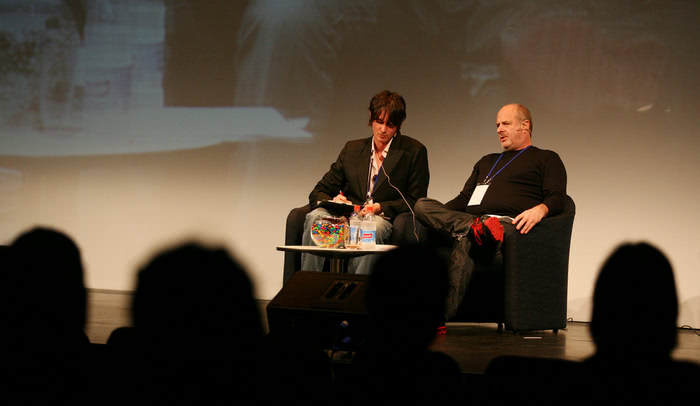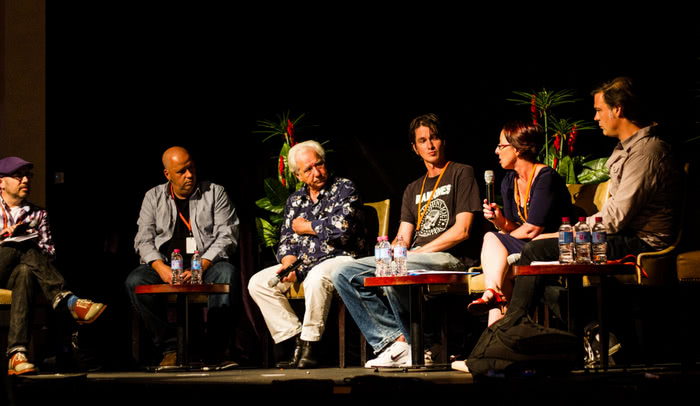Valentine’s Day has a little piece of my heart, though I’m as romantic as a mudflap. You see, on this day exactly 20 years ago, I was invited to take a good, hard look at this strange industry, and do it for a living.
On Feb. 14, 2000, I was stood in my bedroom, downstairs in a ropey sharehouse in Streatham, south London, when I took a call from the mighty Adam White, then VP of Billboard Music Group and international editor-in-chief. Adam made me an offer I couldn’t refuse. Join the team.
Just moments earlier, the Royal Mail dropped off Standing on the Shoulder of Giants, an Oasis CD I’d won in a newspaper competition. It was a winning day. I probably also bought a lottery ticket for a heat-check.
Twenty years ago today, on Valentine’s Day, I called time on my two sleepless years with the Financial Times group for a dream gig with the music industry’s trade “bible,” based at its international bureau in London. Life has moved, fast.
In 2000, the music industry was at its crossroads. The world was turning digital. If you attended MIDEM in the early part of the decade, the conversation on file-sharing would always involve the expression “the digital genie is out of the bottle.” Genies don’t just go back into bottles.
Napster had just arrived and the nerds were filling their boots with tunes. The industry had its back turned, probably counting all that money from CD sales. The good times were about to turn to crud. Double-digit recording industry contraction would soon become the norm.
If you worked in the business of writing about music and the industry, good luck to you. All those job cuts at the record companies meant less readers, less subscriptions. Ad sales were pared back. If you drew a venn diagram with the music industry as one circle, and music journalism the other, we were the little, shrinking space in the middle.
During those difficult years, Music Week’s sister titles fono and MBI folded, as did Billboard’s brethren Music & Media and R&R, and German newspaper Der Musikmarkt.
At its peak, the Billboard international editorial team grew to five. When I left London, it was three. In December 2010, the London bureau was closed for good.
The history books will say Apple came to the rescue, and streaming brought the industry back to life. But there was a time in the noughts when the music industry was falling off a cliff. Many pessimists thought the whole jig was up.
Those of us with long memories will recall some executives walked from the industry, confident they could see no future for the record biz.
True story. The industry has rebounded, and the music trade press has fresh legs. The launch of The Industry Observer in 2017 is evidence of that, as too is the rise of Tim Ingham’s essential U.K. title Music Business Weekly (MBW).
The floodgates haven’t swung open, but it’s no stretch to say 2020 is a good time to pursue a career in writing about music.
Here’s a few lessons learned from 20 years as a music trade reporter.
Read ’til your eyes bleed
Journalists have to be generalists. If you don’t have opinions on everything, you’re an imposter. Read. Make it part of your routine. Read over lunch. Read until your eyes weaken and you need specs.
Newspapers keep you up-to-date, periodicals can give you ideas or angles for stories. Your RSS reader is more important than breakfast.
Laziness is your enemy
Hand on heart, the Test cricket season is terrible for my writing career. The NBA Finals is a killer. When a big game’s on the tele and a deadline is screaming, something has to give.
Distractions are not your friend. Treat them like the plague. Set rules, and stick to them.
Get your facts straight
The worst thing a reporter can do is announce the death of someone who is still very much alive. I’ve seen it happen.
In this frenzied world of 24-7 news where being first looks like a podium finish, getting the facts right is always the winner. Facts matter. If in doubt, leave it out.
The ‘boring’ stuff could be your bread and butter
Word of warning. If you join a music company thinking you’ll get to work on all the cool stuff, pull your head in, pronto. The same goes with writing about the music industry.
Yes, you might get to interview Billie Eilish, but to get there you’ll do countless column inches on the legal framework around content licensing and developments in neighbouring rights. If you’re not up for writing about legal, tech and bean-counting, go see if there’s an opening at ‘New Idea.’
Learn to say ‘yes.’ Learn to say ‘no’
If and when you become good at what you do, you’ll be asked to lend your “expertise”. You might be invited to speak on the ABC, or facilitate a panel at a conference. It’s a good test, it builds your profile and brand, and your mum will be proud. Learn to say “yes”.
Be prepared to say “no” when someone asks you to write for free or if the money’s not right. There’s an old saying, if you’re good at doing something, don’t do it for free. Most of that is true.
Think, dummy
Don’t just space out in your spare time. Get your thinking cap on. Your editors won’t supply you with all your story ideas. Life in the content mines ain’t for everyone. Survivors keep digging. When you’re staring into space listening to whatevs, activate your brain, search for ideas, write them in notes.
There’s a purple patch. It might be 20 years
Humans, like all animals, reach a peak for performance. Then it slowly turns to mush. Athletes have a small window in which to get it done. The most endurable of them all push it to 20 years (take a bow, Vince Carter).
With journalists, there’s a crossover. The cubs are expected to be hungry, but they’re slow to turn around copy (or it sucks). The veterans maybe don’t have the ol’ drive, but boy can they turn around a good story, stat. That space in between, is the purple patch.
It’s that time when you’re hungry to chase down scoops, you still get a buzz from seeing your headline, and you can build the story in your head while making a cuppa. The purple patch just might last 20 years, or more. Get to work.
Find the zone. Don’t waste it
When you’re on fire and the story is writing itself, use it. That’s the zone. It might take two hours to find the zone, and you can lose it by taking a single phone call.
Compete
Writing isn’t a blood sport, but it makes life a little more interesting when you take comfort in beating your competitors. It might be a scoop, a story that sets the agenda and goes global. Don’t gloat, but enjoy victories. They’re few and far between.

Transcribing sucks
A former boss, who is sadly no longer on this earth, once remarked that to be a great trade reporter you must have felt the “cold wind of loneliness.” My best guess is he was talking about transcribing.
Every career has a shitty task. Doctors lance boils, plumbers put their hands in hell. Journalists, we transcribe. It’s a cold wind, alright. If you can touch type, a skill I learned from a single term in year 8, go pat yourself on the back. Transcription apps are now a thing, and you can pay someone else to do it for you, which for a freelancer is just giving some other bloke your hard-fought cut.
If you feel that cold wind of loneliness, congrats. You made it, kid!
Keep a clipping
Keep your best works. You won’t look at them often, but they’re important. My former boss had some sage advice. “Keep clippings of your best works, the stories you’re most proud of,” he told me in sometime in my 20s.
A working journalist will pump out stories, always look ahead. There’s satisfaction in keeping a piece of the past.
Also, keep a digital copy
Websites fold. When they do, your precious copy is lost for good. Always keep your works on file. It’s simple stuff.

It’s not about the cool stuff
If you work in music, you’re probably passionate about the stuff. You’re confident you have better taste than your mates. Face it, you hog the playlists at house parties.
Good taste doesn’t pay the bills. If you write about music and the industry for a living, you’ll also need to write about daggy artists who sell a lot of records and tickets, generate streams, clicks. Sometimes, you’ll just need to put on those ‘Big Boy/Girl Pants’.
Be pedantic about your copy, but not too precious
If you want to be read, you have to be worth reading. Artists torture themselves in the recording studio to make the best record. Sometimes you’ll need to sweat over your own copy. Try not to freak out when an editor tears your story to bits. If it hurts too much, remember you’re getting paid.
Writer’s block. Pffft
Writers block is for people who write hefty tomes with no pictures.
It’s OK to get a photo with legends
Stick it out, you’ll meet many big stars. Sometimes, it’s fleeting. Sometimes, you’ll have dinner with Peter Gabriel in Barcelona (*humblebrag moment). Let’s just get this out there… it’s okay to get a photo with a legend.
Music industry professionals are spoiled. And no-one wants to be seen breaking ranks, getting snaps with the big stars. Regrets, however, are like Lamington-flavoured chips: no one wants them.
Celebrities don’t like to be photographed or filmed just standing around like some schmuck. But they typically don’t mind if you join them in the photo.
If you get a few of your faves, you’ll be glad you did. And your mum will tell all the neighbours.
Careful, maybe you shouldn’t meet your real hero.
An actor friend (he starred in C.S.I., that’s all I’m giving you) had a lairy night with a Hollywood hero at London’s Sanderson hotel. It was wild, and it went wrong. The movie heavyweight behaved like an odious animal, the worst.
The next day, my friend bought a shirt emblazoned with the slogan, ‘Don’t meet your heroes.’ Everyone in this industry has similar experiences. Some of your heroes are just your regular, garden-shed variety tool.
Everyone’s writing a book
We are. We just don’t have time to write it yet.
The limo is for the other guy
Take the bus. You’re a reporter, not the “talent”. Yes, you rub shoulders with the rich and famous. So do waiters. Your pay-packet sucks, spend it on the right stuff. When you have a fancy night out for work, you take the bus home.
Don’t sniff the fairydust
There’s fairydust everywhere in the music industry. And I’m not using that expression as a metaphor for another type of dust. No, it’s the stuff that makes everything seem magical.
Those famous people, those big parties, the mind-blowing shows. It’s fairydust, kids. The best kind. Don’t snort it, just know it’s there.



